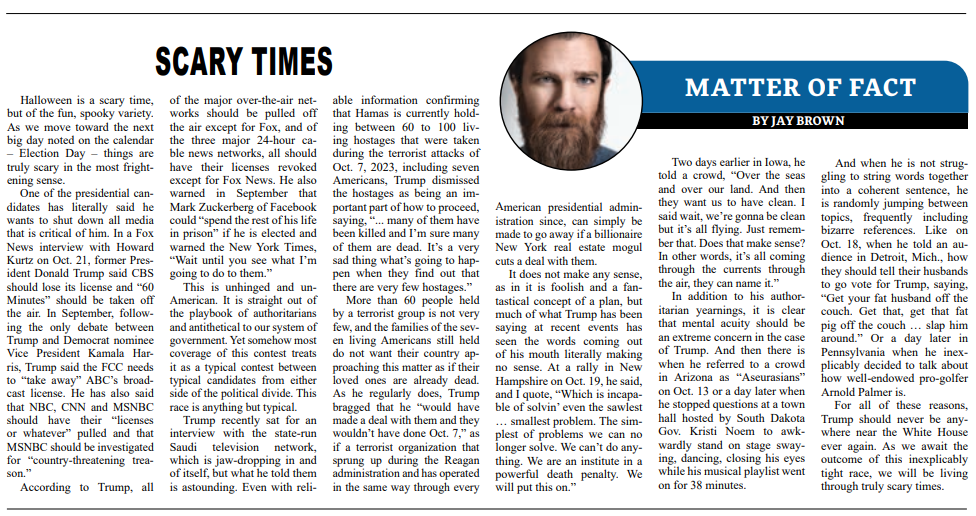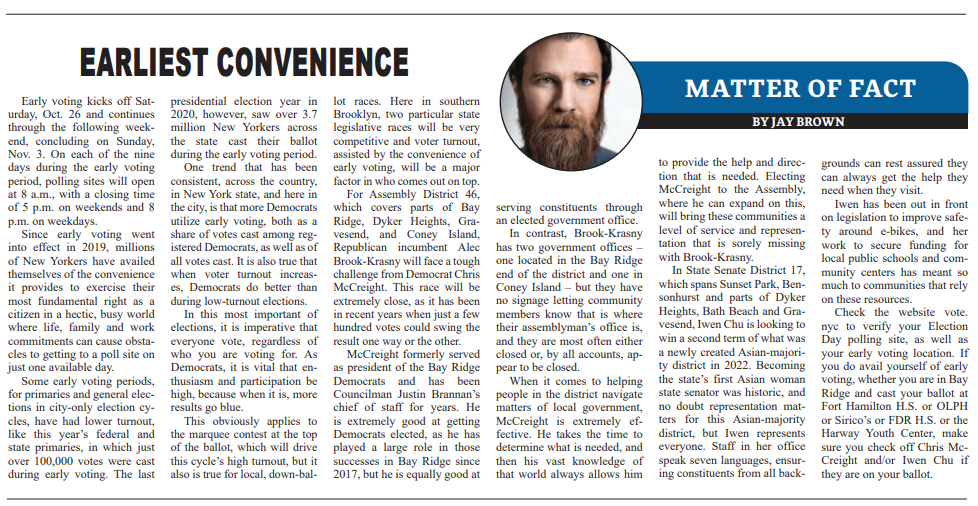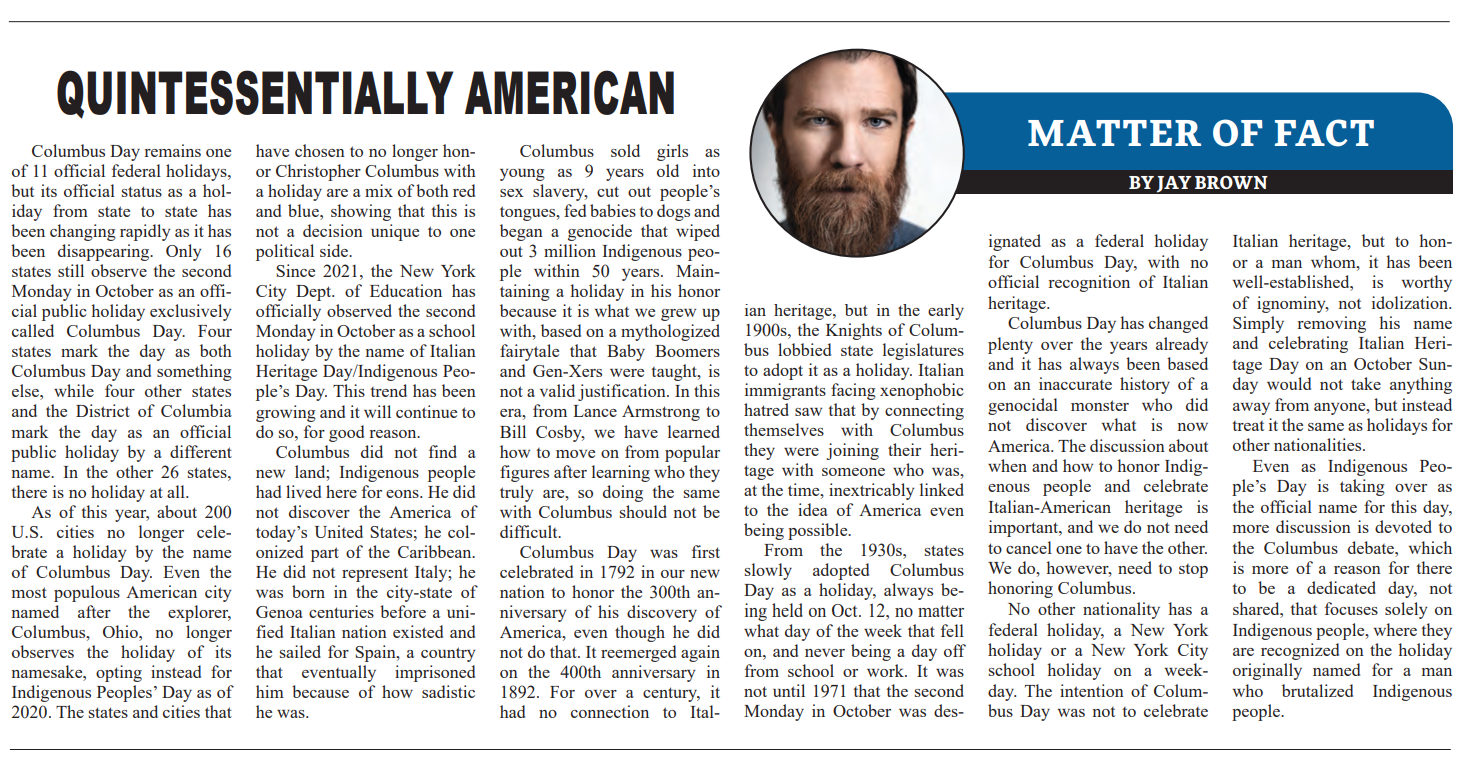This column, from the weekly opinion piece MATTER OF FACT, first appeared in the Home Reporter and Spectator dated October 18, 2019
Councilman Justin Brannan recently announced he would introduce legislation making free eye exams and glasses available to low-income residents of New York City. Those who cannot afford vision care often do not treat it, which negatively impacts school and work performance, reducing productivity and impacting income potential.
Existing health department and public hospital services could cover much of the cost, so the expense to the city would be minimal. While many responded positively to the proposal, there were plenty who complained about assisting low-income residents in this way.

The biggest challenge in addressing any inequity is getting support from those are not affected by it. That applies to citizens as well as the elected officials representing them.
Uneven property taxes are another inequity affecting New Yorkers. Although low-income residents bear the largest burden overall, many middle class communities are being squeezed by the unfair system, with Southern Brooklyn counted among them.
Due to a convoluted mess of rebates, abatements, annual caps, categories established in 1981 and some neighborhoods having seen drastically higher increases in home values than others, an average Bay Ridge homeowner likely pays more in taxes compared to the value of his or her home than the owner of a Park Slope brownstone with a much higher market value.
State Sen. Andrew Gounardes held a community forum on lowering property taxes last week, along with Sen. Brian Benjamin who chairs the Senate Budget and Revenues Committee. Sen. Benjamin was candid in saying that communities like his, Harlem, have contributed to the inequity due to their exploding housing market.
It is difficult for any officeholder to tell her/his constituents that a benefit they are receiving must be mitigated so as to make it fair for everyone, but that is what Sen. Benjamin committed to doing.
Asking certain residents to support changes to address an inequity that doesn’t affect them is what we do as a society. Getting behind such changes only when it is personal to yourself is the height of hypocrisy.

Many New Yorkers took it personally when Mother Cabrini received the most nominations for an initiative to create more statues of female historical figures but was omitted from the monuments that would be created. Mother Cabrini is certainly deserving of recognition.
When celebrating Mother Cabrini, everyone should recognize that she came to the United States during an era of completely open immigration and devoted her life to supporting immigrants who were looked down upon. To refer to any immigrant as illegal or tell them to go back to where they came from would be an affront to what Mother Cabrini stood for.
Maybe Mother Cabrini should be honored in another, more significant way that would address another issue. She would be an ideal historical figure for Italian Americans to use when celebrating their contributions to our country, infinitely more so than Christopher Columbus.
The biggest challenge in addressing any inequity is getting support from those are not affected by it.
Columbus never even set foot on what is now the United States. He came to the new world four centuries before the nation of Italy was formed, sailing under the flag of Spain.
Whether it be Lance Armstrong or Matt Lauer, we are now accustomed to recognizing that the myths around modern public figures may belie terrible truths about them and we adjust our views of them accordingly. Besides his loose connections to Italy and America, Columbus was a horrible human being.
He enslaved peaceful people, sold young girls into sexual bondage, fed babies to dogs and started a genocide that in 50 years’ time exterminated all three million native inhabitants of the island of Hispaniola. His atrocities were so horrific that Spain eventually imprisoned him.
Italian Americans have contributed so much to our country. It should be offensive that Columbus is the figure used to celebrate that.
Vision care, property taxes, Mother Cabrini and Christopher Columbus may seem totally unrelated, but whenever we deal with any issue, we cannot pick and choose which aspects we want to recognize and simply ignore those that are not beneficial to us or our views. Or at least we can’t if we want to effectively address the challenges we all face together.




